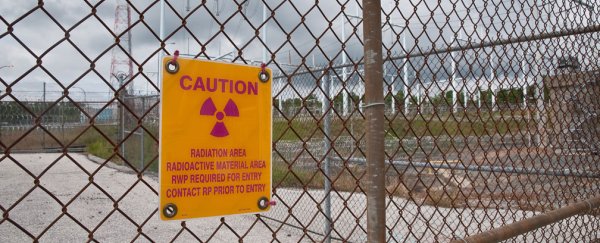Even outside the nightmare scenario of a nuclear war, the continuing fallout stemming from the 2011 meltdown of the Fukushima Daiichi power plant in Japan serves as an alarming reminder of the harmful effects of radiation. However, new research suggests that the deadly effects of radiation can be significantly countered if an existing medication called TP508 is administered up to 24 hours after radiation exposure.
Researchers at the University of Texas Medical Branch in the US have found that a single injection of TP508 – a regenerative peptide drug that stimulates repair of skin, bone, and muscle tissues – significantly delayed mortality in mice that had been exposed to a potentially lethal amount of radiation. If it were to have the same effect on radiation-exposed humans, which is likely, TP508 could be used as an immediate aid for people in situations like Fukushima.
"The current results suggest that the peptide may be an effective emergency nuclear countermeasure that could be delivered within 24 hours after exposure to increase survival and delay mortality, giving victims time to reach facilities for advanced medical treatment," said Carla Kantara, lead author of the research, in a statement to the press.
The drug increases radiation survival chances by counteracting damage to the gastrointestinal system, which is the most lethal effect of exposure to radiation. Gastrointestinal toxicity syndrome, which results from radiation destroying the lining of the intestine, decreases the body's ability to absorb water and leads to infections, intestinal leakage, and ultimately death.
"The lack of available treatments that can effectively protect against radiation-induced damage has prompted a search for countermeasures that can minimise the effects of radiation after exposure, accelerate tissue repair in radiation-exposed individuals, and increase the chances for survival following a nuclear event," said Darrell Carney, co-author of the research. "Because radiation-induced damage to the intestines plays such a key role in how well a person recovers from radiation exposure, it's crucial to develop novel medications capable of preventing GI damage."
Fortunately, that's what TP508 appears to be. In previous human trials, the medication was shown to increase the rate of healing in diabetic foot ulcers and wrist fractures, with no drug-related negative side effects. Of course, researchers won't get a chance to confirm whether TP508 has the same beneficial effect on humans exposed to radiation as it does on mice until the next nuclear emergency arises, but it's great to know that scientists are now aware of the potentially life-saving properties of this medication.
The research is published in Laboratory Investigation.
